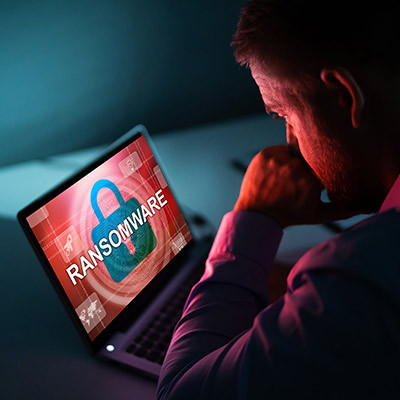One of the ways that businesses have approached the issue of having to log into multiple different accounts, applications, websites, and services is through the use of single sign-on solutions. It’s a common technology that you might see just about every day, but how does it work, and what kind of security can you expect from it?
BNMC Blog
Do you remember the good old days when you could go down to the store and purchase antivirus software that you installed off of a CD-ROM? It used to be the case that this would be enough, but if you think that’s going to cut it these days, think again. Businesses have so much more to worry about in the realm of cybersecurity.
You know the term “ransomware.” It’s all over the news, and it’s because it’s a huge threat to all types of businesses, regardless of size or industry. If you want to protect your business’ future, you have to implement security measures that will allow you to not only address ransomware but prevent these attacks altogether. Depending on the type of data you store, you might find yourself more susceptible to ransomware attacks.
When you picture cybercrime, what goes through your mind? Do you see a hacker in a dark hoodie sitting in the corner of a room with lines of code furiously buzzing across the computer screen? If so, we have some news for you; cybercrime is anything but this perception. Let’s examine organized cybercrime and why it’s important for your business to take its growth into a full-blown industry seriously.
Email plays a critical role in the communications infrastructure of any business, and therefore it is extremely important to shore up its defenses so hackers cannot take advantage of it as an outlet into your network. It’s true that most businesses don’t understand just how important email security is, and if it’s not addressed, it could be quite costly for your organization.
Cybersecurity has to be a priority for every business and one of the best ways that you can gain the perspective you need to make the right decisions is to look at the statistics. Today, there is more known about how hackers and scammers try to get around cybersecurity efforts than ever before and it can help you develop a strategy to combat cybercrime.
Ransomware is one of the worst strains of malware that your business could encounter. It makes cyber-extortion possible and can be a big problem for any business that happens to come across it. You need to learn what ransomware is and how to protect your business from malware and other cyberthreats.
Technology is so commonplace in today’s society that it’s often portrayed in unrealistic ways, especially in entertainment. Hackers, for example, don’t exist in the same sense that they do in the entertainment industry. Let’s take a look at some of the biggest differences between how hackers appear in television and media compared to what they are really like in the real world.
Have you ever noticed how you might start to get unsolicited emails from various organizations asking you for your input or asking you to consider using one of their services? Chances are the culprit behind this action is data scraping. If used properly, scraping can be used as an effective marketing tool, but it can also be utilized by hackers and other malicious or unethical entities in a more nefarious way.
To the layperson, a business is a business is a business. From your customers to your employees, they don’t always view businesses on a sliding scale. For the enterprise business, this is an advantage, since most digital tools are developed with the B2B enterprise space in mind. For the small business, there are definitely times when the software they use is more than they will ever need and it can be more expensive than they would normally need. In today’s blog, we’ll go through a few technologies that enterprise businesses use that small businesses can use too.
Adept (noun): someone who is a professional at a given task, possesses knowledge needed to be successful in completing said task.
While this level of skill is important to cultivate in all aspects of business, it is perhaps most important where cybersecurity is involved. Let’s go over a few practices you can adopt and adjust to improve your business’ network security—specifically, in terms of bringing professional-level expertise on for assistance.
Today’s blog might seem a bit simple, and that’s because it is. Your network security is going to play a huge part in the operations and functionality of your business, whether you realize it or not. In fact, your network security might be the only thing keeping your business in proper working order. We’re going to discuss some of the less-obvious reasons why security is beneficial for businesses like yours.
Network security can be challenging for businesses, but it doesn’t have to be. By following some simple practices, you can level up your security measures considerably, without investing a ton of time, effort, or resources into it. Here are three ways you can improve your business’ security practices without breaking the bank.
Ransomware can be disastrous for any business that gets hit by it, but not always in the way that you might expect. It might threaten business continuity and compromise data security, but it can also directly impact the way that the public views your company. In fact, the decision you make about whether or not to pay the ransom can be a major deciding factor in whether a customer will stick with you.
With cybercrime more prevalent than ever, the importance of keeping your business protected cannot be overstated. In fact, it is so important that there’s a C-suite level role dedicated to it: the Chief Information Security Officer—the CISO. While such a position is fairly common amongst enterprise organizations, smaller businesses might not be able to implement this role in their own hierarchy… at least, not without assistance.
Digital transformation—or the integration of digital technology into all aspects of operations—has been a hot topic of consideration for businesses of all sizes. Let’s consider how you should approach your transformative processes as you work to keep your business competitive with those who are also embracing technology.
Penetration testing is a term that you often hear about, but won’t really understand it unless it is completely explained to you. Well, you’re in luck because in today’s blog we will explain what penetration testing is and why it is important for data and network security and maintaining compliance with regulatory requirements that your organization operates under.
Today’s business world is subject to countless scams and cybersecurity threats, and it’s your job to ensure that your company does not fall victim to these scams and con artists. How can you be sure that the many messages you receive on a regular basis are actually from legitimate sources and not from someone out to make a profit off your business? To put it simply, awareness is the key.
There are many ways that hackers have attempted to subvert the advanced security precautions implemented by enterprises and small businesses alike, but some of the more recent and crafty ones include sending threats through seemingly legitimate sources, like social media. The latest in this string of attacks includes Google Docs, and it is problematic for a number of reasons.
One of the most dangerous threats out there is ransomware, and for good reason. In many cases, the problems from ransomware can have far-reaching and devastating consequences for businesses, no matter which industry they operate in. Let’s take a look at why ransomware is so problematic and what you can do to stop it.






















